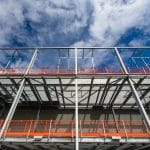Leading commercial fit-out contractor, JCA, considers how flexibility, staff wellbeing and integration of technology have become major design factors in creating happy and productive office environments.
Workspace design is evolving at a rapid pace, as organisations compete to attract and retain the brightest and best talent at a time when the UK’s skilled labour pool is reducing.
Whereas in the past office design focused on the space itself, interior designers creating the latest workspaces are tasked with developing environments that provide staff with a holistic space that’s comfortable, healthy, promotes positive thinking and enables them to be as creative and productive as possible.
As we have become more pre-occupied with getting the right work/life balance, so employers are increasingly looking at designing workplaces which encourage, rather than restrict social interaction. In larger firms, the conventional office canteen, for example, is steadily being replaced by concepts such as ‘juice bars’ and ‘coffee stations’ in order to promote staff engagement and the exchange of ideas throughout the working day, rather than just providing a place to eat. In this sense, the line between work, home and social life is becoming increasingly blurred, as workspace design centres around both the physiological and emotional needs of employees, as well as being a place of business.
The need to provide more holistic workspace has been reflected in recent research by Office Genie. A survey of 1,500 workers found that almost three-quarters were not provided with an area to relax and 45% felt that the design of their office did not promote collaboration. Of course, older offices are finding this a particular challenge, as they were never designed originally with collaboration in mind.
Although having open space at work is not a new concept, its design and location within the office is now a vital consideration, for giving staff an alternative space in which to take time out or be creative. The open nature of these spaces is also essential in order to promote more collaboration, by making them visible and easily accessible.
Conventional meeting rooms are also being reconsidered with a growing trend of companies tearing down walls in order to promote a culture of teamwork, openness and transparency. Enclosed rooms and cubicles are being replaced with social spaces and open ‘meeting zones’. Such areas are often defined by divider panels made from natural materials such as bamboo, or sometimes display units, different floorcoverings and brightly coloured furnishings.
While workspaces have always provided dedicated rest areas for staff, some companies are looking to boost performance by creating ‘recharge spaces’ as a means of improving productivity. The thinking behind this trend reflects the simple concept that tired staff are less productive. This idea has already gained traction with businesses in many sectors of industry, introducing everything from giant bean bags for power naps, meditation spaces, in-house gyms and even saunas. And while some companies might see a recharge space as a luxury, firms such as Google, Microsoft, Twitter and Unilever are reaping the benefits of allowing the staff the time and space to recoup.
Use of colour, varying textures and finishes in the work environment have also taken prominence through the emergence of ‘biophilic’ office design, which articulates the relationship between nature, human biology and the built environment. It’s based on the principle that we have a genetic connection with the outside world, so for the benefit of our wellbeing, we should be bringing more natural elements such as wood and stone into the workspace. As a result, use of natural materials has become another increasing trend, to include even the planting of trees in areas with high amounts of natural light. Bringing the outdoors indoors, therefore, is something of a mantra within the design community.
As our workplaces continue to evolve, it’s important to remember that design should be unique to a specific organisation, as opposed to a ‘one size fits all’ approach. As a leading workspace fit-out and refurbishment contractor, JCA offers a complete bespoke service for all types of premises.
Click here for more information on our capabilities.


